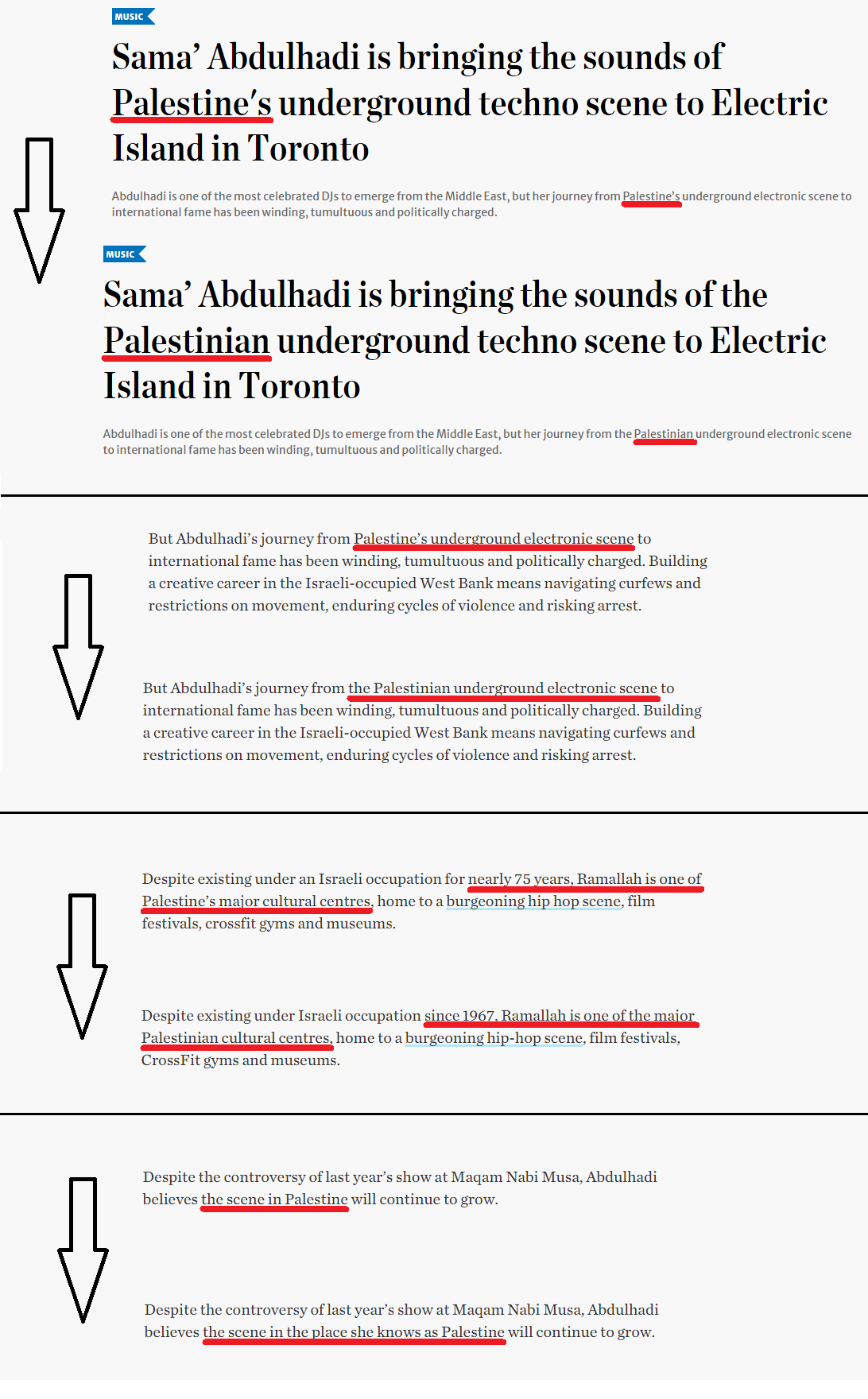On September 2, the Toronto Star published an article about Palestinian DJ Sama’ Abdulhadi. The feature was released in advance of her appearances at shows in the city that weekend, and largely focused on her path to international fame after an incredibly well-received 2018 Boiler Room set.
Throughout the course of the article, unsurprisingly, the word “Palestine” was used on a few occasions, including by the writer. This attracted the attention of Honest Reporting Canada (HRC), a lobby group that claims it exists to “fight media bias against Israel.” (I’ve written a primer on the group in the past, which you should read now if you aren’t familiar with them.)
HRC claims that they reached out to the Star to express their complaints about the article, including that the word “Palestine” is used and that the writer states Ramallah has been under Israeli occupation for 75 years.
Eventually, the Star made several changes to the article, as well as its heading and subheading, that impacted both the online version and the one that would go into print. Here’s a list of every change I could find between the original article and what’s now featured on the site.

The last change is particularly demeaning, reducing a name with thousands of years of history to some sort of term of endearment Abdulhadi has for her home. As a whole, these changes help bolster an Israeli narrative that Palestine doesn’t exist. Here’s an example of this narrative in action from HRC on Twitter, sent out earlier this month following the publication of the article (shortly after which they had their account locked for “breaking [Twitter’s hateful conduct rule”).

This isn’t the first time the Star has made such a change, either. On Jan. 11, 2021, they published an article about a federal judge interfering in the hiring process at the University of Toronto to get a job offer made to a scholar revoked. The article originally described the author’s work as focusing “on the issue of Israel’s human rights abuses in Palestine.” This was noticed by HRC, who complained about it, and the relevant portion of the sentence was later changed to “on the issue of Israel’s abuses of Palestinian human rights.”
These sorts of changes are typically noted by publications with editorial standards through a disclaimer at the bottom of the article, usually starting off with “update,” “clarification” or “correction.” The article about Abdulhadi does have a correction notice, but it only applies to the change regarding how long Ramallah has been under Israeli occupation. It doesn’t mention any of the other substantive changes to the article, headline and subheading the editors made.
So, I reached out to the Star’s public editor on Tuesday morning to ask them the following:
- Why were these changes made? What style guide were the changes based on?
- What role did Honest Reporting Canada play in getting these changes made? Has the Star ever held a meeting with the group?
- Why are these changes not noted in a correction/update/clarification at the bottom of the article?
I have yet to hear back from them.
The Star’s decisions here are, unfortunately, not unique. In fact, I’ve previously written about how style guides at many media organizations, broadcasters and newspapers in the West prohibit the use of the word “Palestine” in most circumstances. The organizations I included in this article were the Associated Press, CBC, BBC, Australian Broadcasting Corporation, Deutsche Welle, Los Angeles Times, Washington Post and The New York Times.
Most news organizations in Canada rely on the Canadian Press (CP) style guide to inform these matters in their papers, and often attribute their choices to them. But there are two things to consider here.
First, the CP style guide has no policy prohibiting the use of the word “Palestine,” meaning papers have the responsibility of deciding to allow it or not. Second, papers don’t have to follow what CP recommends, and certainly don’t always do so, for better or worse. For example, in 2016, the Star made the decision to start referring to “ISIS” as “Daesh,” something CP doesn’t require, and in fact only allows the second time the group is referred to in an article.
With that in mind, the Star should: 1) clarify if they have an internal style guide policy prohibiting the use of the word Palestine in most cases; 2) if so, explain why they do; 3) change their policy to be in line with the international consensus.
Instead, in recent years the Star has proven to be particularly susceptible among mainstream Canadian news outlets to complaints from Israel lobby groups. Since 2021, the Star has made changes after such complaints to at least 14 articles. (For comparison, The Globe and Mail is listed by HRC as having made five, and the National Post just one.)
Many of these changes aren’t due to errors, but rather just printing things that don’t completely comply with the Israeli narrative. Here are some examples:
- Changing the headline “Israeli police: Palestinian teen fatally shot after stabbing” to “Palestinian attacker shot dead after stabbing Israeli police”
- Changing the headline “ICC launches war crimes probe into Israeli practices” to “ICC launches probe into alleged war crimes in Palestinian territories,” after the HRC claimed that the original headline presumes guilt, even though it’s accurate and does no such thing
- In another similar example, changing the headline “Human Rights Watch: Israeli war crimes apparent in Gaza war” to “Human Rights Watch: war crimes apparent in Gaza war,” misrepresenting the report in favour of a ‘both sides’ narrative
With this in mind, as mentioned earlier, we deserve to know more about the amount of influence HRC has at the Star, and why editors there have reacted so deferentially to the complaints of a group effectively doing PR for an apartheid state.







